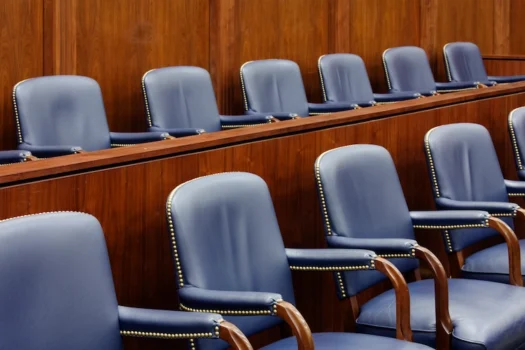
In State v. John T. Bragg (A-13-24/089446) (Decided May 6, 2025), the Supreme Court of New Jersey held that the jury should have been instructed on the castle doctrine and, therefore, any conviction involving self-defense must be vacated. Under New Jersey law, while individuals may use force against others to protect themselves, they may not use deadly force if they can retreat with complete safety. The castle doctrine provides an exception to the duty to retreat: a person “is not obliged to retreat from his dwelling, unless he was the initial aggressor.”
Facts of State v. Bragg
On the night of September 30, 2017, defendant John Bragg (the “Defendant”) drove Lorenza Fletcher, her cousin Daquan Anderson, and her three-year-old son to an apartment complex in Trenton, where he signed in with a security guard in the lobby of the complex. The State points to that as evidence defendant was a guest, not a tenant.
The group then went to an apartment on the ninth floor. According to all three adults, the Defendant had a key to enter the apartment. Inside it was an air mattress, a television, pots and pans, and some alcohol. The Defendant testified that he had an informal sublease with the apartment’s tenant and had been staying there for “a few weeks” by the night in question.
At the apartment, a violent fight erupted. The police arrested the Defendant and took him into custody. A grand jury later returned a nineteen-count indictment charging defendant with various offenses, including those for which self-defense may be asserted as a defense.
Defendant, Fletcher, and Anderson all testified at trial. The Defendant claimed Fletcher and Anderson initiated the fight; they claimed the Defendant was the aggressor. As a result, self-defense was a focal point of the trial. The State repeatedly questioned the Defendant about his claim of self-defense and highlighted that the Defendant did not retreat from the apartment in cross-examination and summation. The trial judge conducted two conferences about the proposed jury charge. The charge did not include guidance on the exception to the duty to retreat. The jury found the Defendant guilty of twelve counts in the indictment and of two lesser-included offenses. The Appellate Division affirmed defendant’s convictions and sentence, finding no plain error in the failure to instruct the jury on the exception to the duty to retreat.
NJ Supreme Court’s Decision in State v. Bragg
The New Jersey Supreme Court found it was plain error not to instruct the jury on the castle doctrine. As a result, it vacated the counts of the Defendant’s conviction that involved the issue of self-defense.
“Whether defendant should have retreated was a critical part of certain offenses charged in this case. Jurors heard the State press the point at trial; they also heard conflicting accounts of who the ‘initial aggressor’ was and whether the apartment was defendant’s ‘dwelling,’” Chief Justice Stuart Rabner wrote. “But the jury received no direction as to how those disputed facts related to — or had the potential to negate — the duty to retreat in this case.”
The New Jersey Supreme Court went on to find that under the circumstances, the failure to give the jury guidance on the castle doctrine was clearly capable of producing an unjust result. It emphasized that each side accused the other of starting the fight, and each had injuries to support their claim, both of which were disputed factual issues for the jury to decide. However, the jury was not asked to resolve them or receive any guidance about the significance of either issue or the overall exception to the duty to retreat. “Without that information, the jury was clearly capable of finding that defendant was required to retreat rather than use deadly force,” the Chief Justice wrote. “Yet a proper instruction was just as capable of leading jurors to conclude defendant had no such obligation and could stand his ground and defend himself if he was attacked.” Accordingly, the Court found it was plain error not to instruct the jury on the issue.
Lastly, the New Jersey Supreme Court rejected the argument that any error here was invited because nothing in the record established that defense counsel induced or encouraged the erroneous instruction. Going forward, the Court advised that, to facilitate appellate review, trial judges mark for identification drafts of proposed jury charges discussed at charge conferences and retain them as part of the court file.
